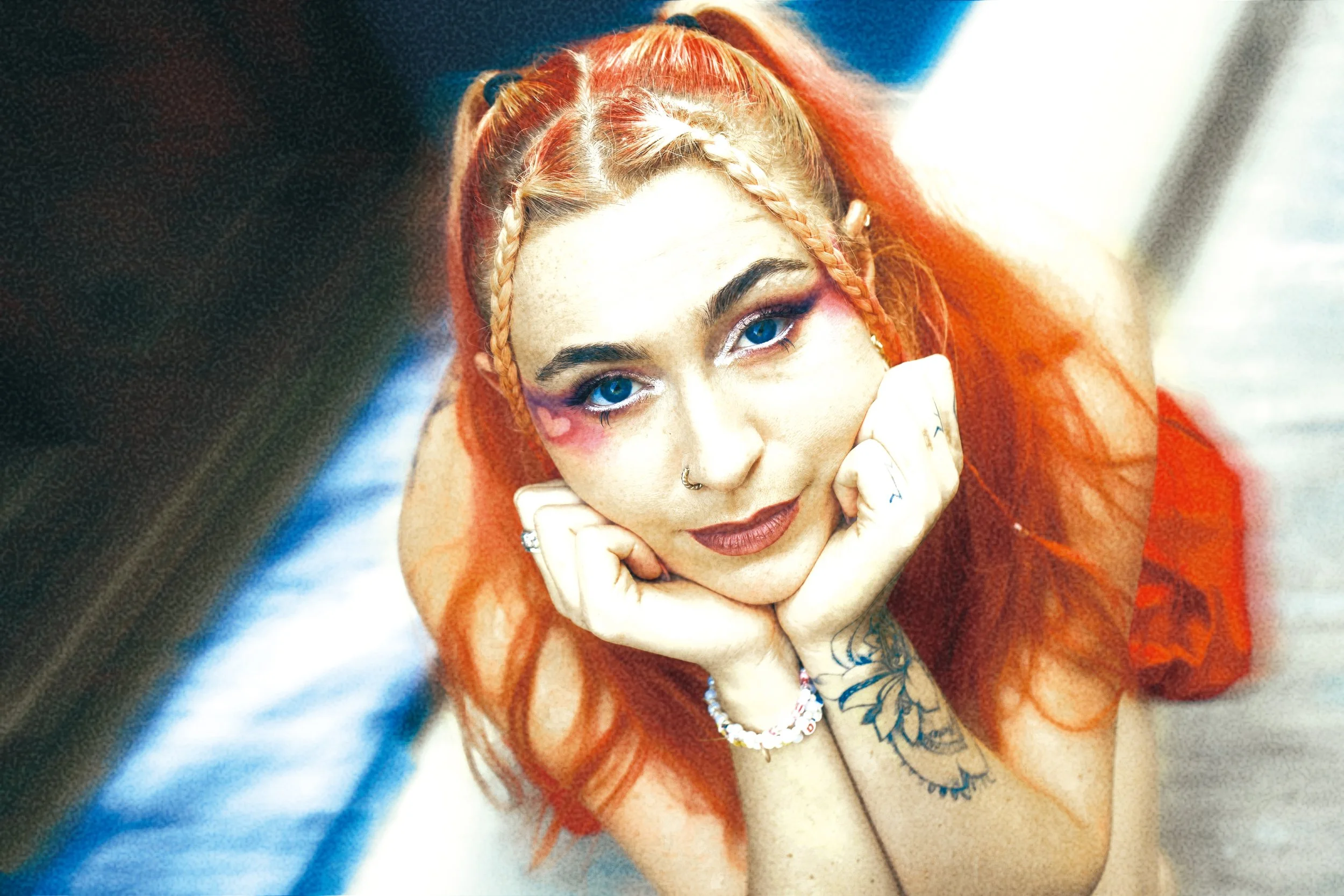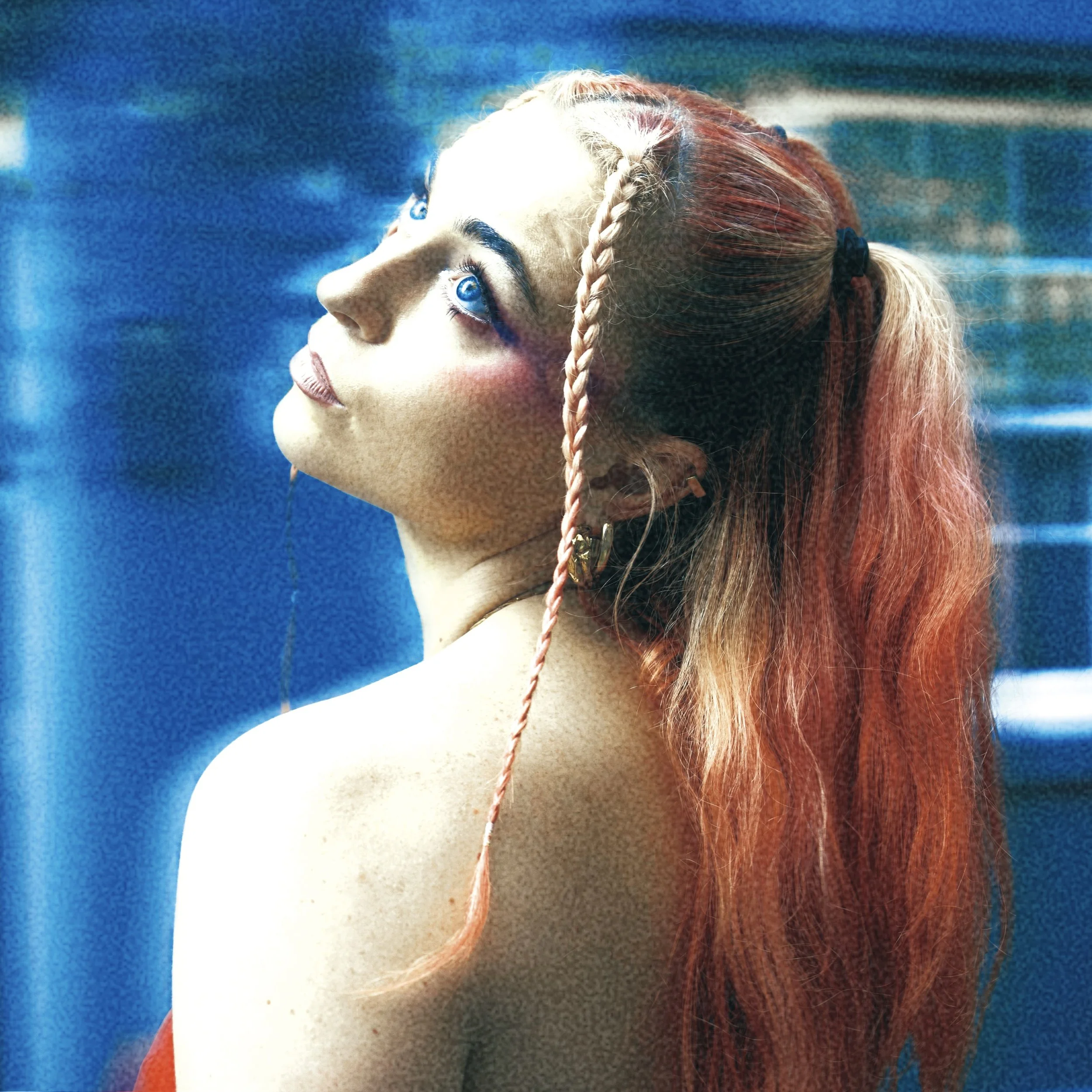More Than Music: How Dolly Doops Uses Art to Heal, Connect, and Empower
In a world where authenticity is often filtered, Dolly Doops is refreshingly real. Based in London by way of the Isle of Wight and New York, the queer indie-pop artist crafts music that’s as emotionally raw as it is sonically infectious. Whether she’s blending synth-driven beats with vulnerable lyrics, or volunteering at a community arts organization for the unhoused, Dolly is constantly exploring how creativity connects us — and how identity shapes the stories we tell. To find out more, read below.
Where are you based?
I’m based in London, UK right now. My parents live in the Isle of Wight in a funky little seaside town called Ventnor. So I go there a lot to rest from the city and see them. I’d been bouncing around living there and in New York.
What inspired you to get into music?
I started singing before I could even speak. I come from a very creative family, neither of my parents are musicians, though both me and my brother are. My parents are artists of other art forms with a huge appreciation for Music. We were exposed to lots of different music and ways of expressing yourself through art and performance at a young age. It became my way of dealing with some dark years I went through. I had an awful time at school and it was my only way out. I loved watching music videos and live shows growing up, the world that could be created, it always inspired me.
How would you describe your sound and aesthetic as an artist? What draws you to synth/indie pop as a medium of self-expression?
I would say fun, but gritty. I love making upbeat songs that have a deeper darker subject in them. I kinda always go towards writing about sadder, more heartbreaking subjects, but I love pop music and the way it makes me feel. I think it’s such a great thing to pair the two, bouncing them off each other. I love synths and Synth basses, Arpeggiators and just all the really cool sounds. I grew up to a lot of different kinds of pop and I feel like I draw on all my inspirations that make me feel something.
As a gay femme artist, how does queerness shape your music and visual presentation?
Being queer makes me confident to express myself. As a kid I used to wear some really out of the box stuff. I would love dressing up and being quirky, but as I got into the teenage years, I started to be much more aware of how I was perceived and society’s idea of what girls and women should look like. I lost that spark, it really broke me up and affected how I first started to make music. But a lot of uncovering my queerness and my queer journey has unlocked that part of me again to be free in who I am, in the music I make, whatever colour my eyebrows and hair, and whatever makeup or outfits I express myself in.
What’s your songwriting process like? Do you start with lyrics, synth textures, mood boards, or something else entirely?
I like creating a story board. I need to fully understand the story I’m telling so I can then begin to tell it correctly. I write on physical note pads a lot, I’ll fill the first two pages with words and phrases that resonate and start to shape them around melodies and structure. I often write pages of lyrics that have no melodies, but I’ll have an idea or rhythm I want for them. Other times, I need to find that groove of the music before I can find the words.
“With or Without You” is a really fun song. Can you tell us the story behind this song?
Thank you so much. I guess it’s a story, a real one for me, that’s been felt and told a million times. Going back to someone after you’ve broken up. You know you’re better without them, but the idea of being alone, and the pain of losing those memories, is too much, so it’s like let’s just pretend again for another night that we are okay together.
You volunteer with the 240 Project. Can you tell us a little bit about this organization and your work with them?
It’s a charity that was set up to use creativity and wellbeing to increase the confidence and self belief of the homeless. It now works with a much broader client base, working with the socially excluded, the vulnerable, those that are struggling to cope. In my role there, I work as a facilitator who talks to them, supports them and helps them with any practical difficulties they encounter. Sometimes, what that entails is just chatting or not chatting and just sitting, being with them, making art together, or just listening.
You’ve worked closely with people who have experienced extreme social exclusion. How do you use music or creativity to build connection or joy in those environments?
At 240 one of the main things it focuses on is to offer a creative outlet for our vulnerable members. The chance to make art, have someone take it and them seriously, gives them confidence. The music sessions, the creative writing sessions, the art sessions we hold, all allow them to express how they feel. And from that expression we nurture a connection, give them a sense of belonging and share some joy.
How do you define “community” as an artist? And how do you think artists should show up for their communities?
I think our communities are what makes us us. I think the saying “it takes a village” doesn’t just apply to raising kids, but us as adults and who we have supporting and leading us. I wouldn’t be able to understand who I truly am without a community. I want to support my community the way they support me and I think as an artist that is so important. Those are the people who make you you.
How do you find music and the arts to be healing?
I’ve always found peace through art, even when I’m expressing something hurtful that has happened. I’ve written a lot of songs that will probably never see the light of day because I just needed to write them to release a feeling. I think creating is so powerful that it can help us understand feelings, sometimes you might not quite know what the feeling is or where it’s coming from or what it is and art is a way to channel it and get to the source. I’m also a big believer in when you write things down it makes it real.
What have the members of the 240 Project taught you about resilience, creativity, or what it means to belong?
Some of the members of the project have been through extremely traumatic experiences and it’s humbling and rewarding to see how they manage to cope and create out of those desolate experiences. What I’ve seen is the pleasure and sense of purpose the creativity has given to them. I watch as they come in and dedicate themselves to making their art in a safe space. They really commit and pride themselves on it.
How does the 240 Project fill gaps left by overstretched or underfunded services? What do you wish more people understood about that reality?
I think there are increasing numbers of people in financial and emotional need everywhere, and places like 240 provide a safe, non judgmental space to create and belong to something. It’s so easy for people on the other side of it to dismiss those excluded from society as deserving what they get. But circumstances can turn on anyone, any of us could be unexpectedly thrown into a difficult, unmanageable life. Often they are seen as the dregs of society, but when you work so closely with them you see they are the same as the rest of us — complex, sensitive human beings. And what has happened to them could happen to any one of us.
How do race, gender identity, queerness, or class intersect with the issues your members face, and how do you navigate those dynamics in space?
Let’s be honest, society has those it supports and those that are marginalized. Some things have improved, but there’s still a long way to go. Our members, some of who have been shunned or turned against because of their race, class, gender identity or queerness, have a refuge at the 240 Project. The space accepts them as they are and everyone is valued for who they are.
The USA has a huge affordable housing crisis happening nationwide. How is affordability in the UK? How can we help those who are struggling with homelessness?
Ah the UK is a mess too, especially London. There is a serious cost of living crisis, with many people struggling to cope, to buy the food they need, to pay the rent. I think one of the great things in the UK is the NHS and the incredible people that work in, giving free care and support to those who most need it. Minority groups and the poorer are being pushed further and further out of cities in the UK and the ‘affordable’ living isn’t even near enough affordable for those on the living wage. I think a small free way we can help those who are struggling with homelessness is empathy, and any little or small gesture could go a long way.
It has been a crazy past few years, and we suspect at least four more. How have you been staying positive?
Spending time in those communities that keep you grounded but also around likeminded people. Focusing on the small things I can do for change, being an ally and supporting the groups that need it. I’m not the person that can turn the world around, but I can do what I can in the spaces around me to push for that change.
What is your motto in life?
I’m very big on mindfulness and embracing everything in the now. I love living in the present and using practices to help me channel emotions that have the potential to throw me off track but I let them actually help me understand where I am, what I need, and how I really feel. Oh and kindness. Kindness is key. Always.
To learn more about Dolly Doops, visit the links below:
Spotify, Apple Music, Youtube, Instagram, Tiktok, 240 Project, Other links
Photography by Ilaria Schaeren.






